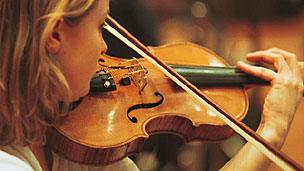English Bacc music GCSE warning
- Published

Musicians warn that GCSE music will suffer from its exclusion from the English Bacc
It could become "impossible" for young people in England to study music GCSE, if the English Baccalaureate is kept in its current form, a professional body for musicians says.
Music is not included in the proposed English Bacc list of GCSE subjects.
And the Incorporated Society of Musicians is writing to the schools minister to say teachers are reporting the subject is being "squeezed out".
An education department spokesman said funding for music was being protected.
A final decision on the shape of the English Bacc, for the 2012 league tables, is expected from ministers in the next few weeks.
'Almighty shock'
But Incorporated Society of Musicians chief executive Deborah Annetts said teachers had already reported a drop in pupils taking music GCSE and one school where it was no longer on the curriculum.
The English Bacc sets out the subjects on which league tables will be based showing how many pupils achieve at least a C grade.
The subjects proposed by the government are English, maths, two sciences, an ancient or modern language and either history or geography.
But critics say this will undermine the teaching of other subjects and limit the choices for GCSE.
"Without music GCSE being given the weighting it deserves, our cultural and creative economy will be put at risk, and young people who want to be involved in the music sector will have their efforts hampered," said Ms Annetts.
"The government is setting England up for an almighty shock in the future if they continue this policy - let alone the impact it is already having on young people who want to study music."
There have also been protests about the absence of religious education and economics from the list and concerns schools will prevent pupils taking both history and geography, when only one will appear in the league-table results.
A Department for Education spokesman rejected the suggestion that music in school was not being supported.
"We've actually protected £82.5m funding for music services this year and are reforming the system so money is targeted where it is needed most in future.
"We're recruiting top music graduates and performers into the profession through Teach First and will launch a National Plan for Music Education later this year - to close the 'musical divide' between rich and poor."
And he said that it was up to schools how they responded to the English Bacc.
"The ball is in schools' court over how they structure their curriculum and best meet pupils' needs. The number of EBacc subjects has been kept deliberately small - leaving plenty of lesson time to offer other valuable academic and non-academic qualifications, like music and RE."
On Monday Schools Minister Nick Gibb told the House of Commons the English Bacc would add to the quality of information available and help ensure more children take core academic subjects.
"The English Baccalaureate is not prescriptive. It is just a measure, one of many measures, that this government are putting forward as part of the transparency agenda," he said.
"It is the next stage in that school's improved performance. It is a concern to the government that children, particularly in deprived areas, are not being offered that combination of choices."
- Published31 March 2011
- Published12 March 2011
- Published14 January 2011